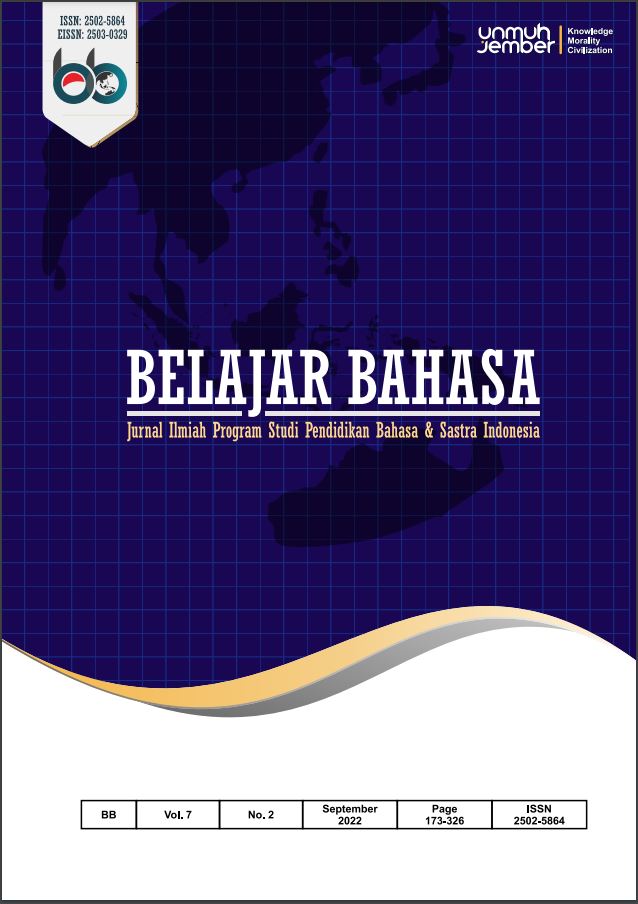Pengembangan LKPD berbasis Teks Argumentatif melalui Inovasi Pembelajaran menggunakan Platform Gather Town di Masa Pandemi
DOI:
https://doi.org/10.32528/bb.v7i2.68Keywords:
LKPD, Teks Argumentasi, dan Platform Gather TownAbstract
The use of argumentative text-based worksheets using the gather two platform is believed to be able to help students in learning. This study aims to develop LKPD based on the argumentative text of Toulmin's model. In addition, the use of gather town is believed to motivate students in learning. The research method used is research and development (R&D). The development stage in this research starts from the development design. The second stage in this development is the expert validity test. Then the last stage is product testing. In this research, there are two stages of development. First, at the stage of the definition results, there are three aspects that have been carried out, namely problem identification, results of identification of LKPD objectives, results of student character identification, and results of problem solving identification. Second, at the design stage, it results in the development of LKPD based on argument text and instructions for using the gather town platform. Then at the trial stage of LKPD based on argumentative text using the gather town platform the researchers carried out several trial stages including (a) the expert validation stage consisting of validation of language learning experts and validation of educational technology experts, (b) the practicality stage consisting of practicality assessments of teachers and students. , and (c) the last stage is an assessment of the application of LKPD based on argumentative text to students.
References
Putria, Hilna dkk. 2020. Analisis Proses Pembelajaran Dalam Jaringan (DARING) Masa Pandemi COVID-19 pada Guru Sekolah Dasar. Junal BASICEDU, 4 (4), https://jbasic.org/index.php/basicedu/article/view/460
Kutsiyyah. 2021. Analisis Fenomena Pembelajaran Daring Pada Masa Pandemi (Harapan Menuju Blended Learning). EDUKATIF: Jurnal Ilmu Pendidikan. file:///C:/Users/ACER/Downloads/580-2387-1-PB.pdf
Alawiyah, Susi. 2020. Pembelajaran Online dan Hasil Menulis Karangan Argumentasi di Era Big Data. Jurnal Sains dan Teknologi. 3 (1), file:///C:/Users/ACER/Downloads/3697-12245-1-PB.pdffile:///C:/Users/ACER/ Downloads/3697-12245-1-PB.pdf
Wekke, Ismail & Saleh, Ahmad. 2021. Pembelajaran di Masa Pandemi: Tidak Hanya Metode Daring Saja. Jurnal Proyeksi. 14, (2), http://jurnal.unissula.ac.id/index. php/proyeksi/article/view/13372/5398
Sulastri, dkk. 2020. Pemanfaatan Platform Digital dalam Pembelajaran Online Selama Masa Pandemi Covid-19 di Sekolah dasar. Jurnal Pendidikan Dasar. 19, (2), http://journal.unj.ac.id/unj/index.php/jpd/article/view/15891/9864
Fannie, Rizky & Rohati. 2014. Pengembangan Lembar Kerja Siswa Berbasis POE Pada Materi Program Linear Kelas XII SMA. Jurnal Sain Matematika. 8, (1), https://media.neliti.com/media/publications/221053-none.pdf
Aldiyah, Evi. 2021. Lembar Kerja Peserta Didik (LKPD) Pengembangan sebagai Sarana Peningkatan Keterampilan Proses Pembelajaran IPA di SMP. Jurnal Inovasi Keguruan dan Ilmu Pendidikan. 1, (1), https://jurnalp4i.com/index.php/teaching/article/view/85/74
Ariani, Desi & Meutiawati, Ida. 2020. Pengembangan Lembar Kerja Peserta Didik (LKPD) Berbasis Discovery Learning Pada Materi Kalor di SMP. Jurnal Phi. 1, (3), file:///C:/Users/ACER/Downloads/6477-15057-1-PB.pdf
Nesi, Antonius & Iku, Priska. 2021. Struktur Argumen Paragraf Argumentatif: Studi Kasus Lima Jurnal Terindeks Sinta Rumpun Pendidikan Noneksata di LLDIKTI VIII. Jurnal Pendidikan Bahasa dan Sastra Indonesia. 6, (1), file:///C:/Users/ACER/Downloads/2036-8117-1-PB.pdf
Setyaningsih, Yuliana. 2016. POLA ARGUMEN PARAGRAF ARGUMENTATIF PADA ARTIKEL JURNAL TERAKREDITASI BIDANG EKONOMI (PERSPEKTIF STEPHEN TOULMIN). Jurnal Adibiyyat. 15, (2), file:///C:/Users/ACER/Downloads/1024-2245-3-PB.pdf
Downloads
Published
How to Cite
Issue
Section
License
Copyright (c) 2022 BELAJAR BAHASA: Jurnal Ilmiah Program Studi Pendidikan Bahasa dan Sastra Indonesia

This work is licensed under a Creative Commons Attribution 4.0 International License.






